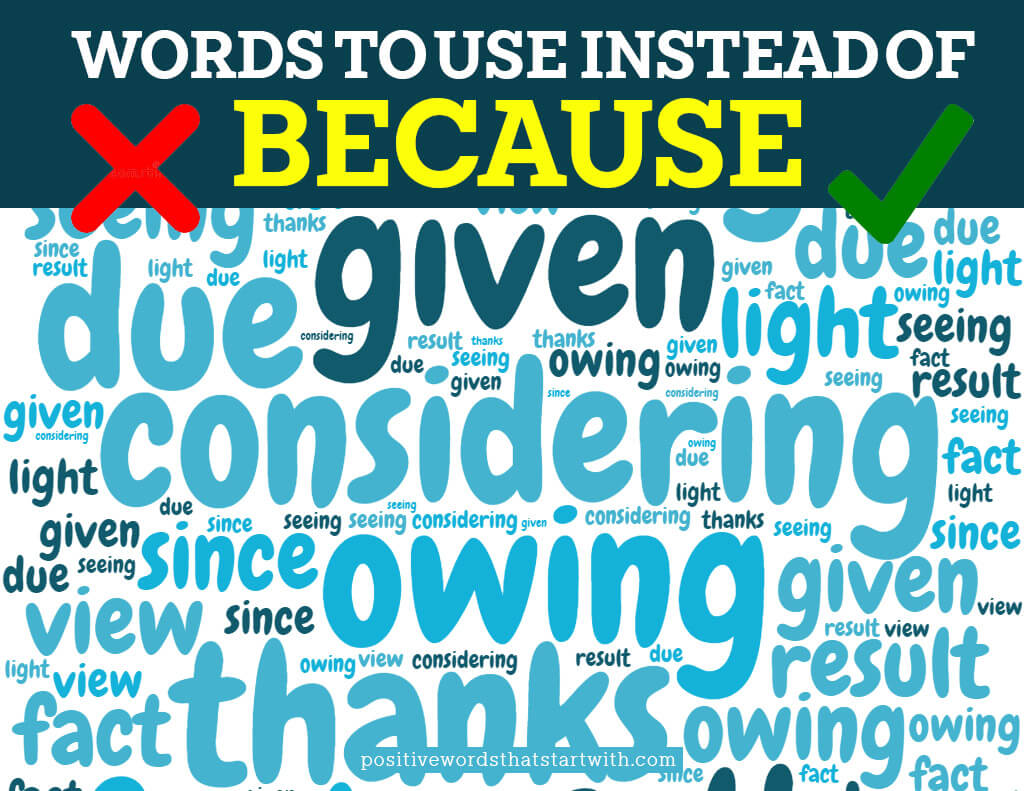
“Because” is one of the words that we tend to overuse. While it may seem like the most convenient way to connect ideas, there are actually many other words you can use instead that will make your writing or conversation more interesting and engaging.
In this article, we’ll explore 11 words you can use instead of “because” to add variety and depth to your communication. Whether you’re a content writer, copywriter, public speaker, or someone that’s simply looking to improve your communication skills, these words will help you express your ideas more effectively and keep your readers engaged.
Words to use instead of “because” include: since, due to, as a result of, owing to, thanks to, given that, in light of, as, seeing that, in view of the fact that, and considering. Here’s why and how to use these words.
Since
“Since” is more precise than “because.” When we use “because,” we are simply stating that one event caused another. For example, “I didn’t go to the party because I was feeling sick.” While this sentence conveys the necessary information, it doesn’t provide any additional context or information.
On the other hand, when we use “since,” we are not only stating that one event caused another but also indicating the passage of time between those events. For example, “I haven’t seen my friend since she moved away.” This sentence tells us not only that the friend moving away caused the lack of contact but also the duration of time that has passed since their previous encounter.
Another reason why “since” is a better alternative to “because” is that it can be used to avoid ambiguity. Consider the following sentence: “I missed my flight because I overslept.” This sentence could be interpreted in two ways: either the oversleeping caused the person to miss their flight, or the person overslept after missing their flight. However, if we use “since” instead of “because,” the sentence becomes clearer: “I missed my flight since I overslept.”
“Since” can also be used to convey a sense of continuity or ongoing action. For example, “I have been working from home since the pandemic started.” This sentence not only tells us that the pandemic caused the person to work from home but also implies that they are still working from home at the time of speaking.
Due to
“Due to” is typically used to describe a cause-and-effect relationship between two things, whereas “because” simply indicates that one thing caused another. For example:
- “The game was canceled due to rain.” (The rain caused the cancellation of the game.)
- “I couldn’t go to the beach because I had to work.” (My work prevented me from going to the beach with friends.)
Another advantage of using “due to” is that it can help you avoid awkward sentence constructions. For example, consider this sentence: “The meeting was canceled because of bad weather.” This sentence is grammatically correct, but it sounds a bit clumsy. Using “due to” instead can make the sentence flow more smoothly: “The meeting was canceled due to bad weather.”
It’s worth noting that some people consider “due to” to be more formal or academic-sounding than “because.” So, if you’re writing a professional document or academic paper, using “due to” may be more appropriate.
As a result of
“As a result of” is a more formal and professional way of expressing causation. It adds a level of sophistication to your writing and can make you appear more knowledgeable and credible. Whereas “because” is more casual and often used in everyday conversation.
The use of “as a result of” is a more exact and detailed way of expressing something. It highlights the direct cause-and-effect relationship between two things, whereas “because” can sometimes be ambiguous and leave room for interpretation. This specificity can be important in technical writing or academic papers where accuracy is crucial.
Using “as a result of” can help avoid the potential negative connotations that come with using “because.” For example, using “because” can sometimes imply blame or criticism, whereas the term “as a result of” denotes the reason behind something without any unfavorable implications.
Owing to
“Owing to” is, just like other words on this list, more formal than “because.” It’s often used in academic writing or in more professional settings, which makes it a great choice if you want to sound more educated or sophisticated.
When you use “owing to,” you’re highlighting a direct cause-and-effect relationship. In other words, you’re saying that one thing happened because of another thing. This can help make your writing clearer and more concise.
Let’s look at an example: “Because I missed my train, I was late for work.” This sentence is perfectly fine, but it’s also a little vague. There could be many reasons why someone misses their train. It doesn’t necessarily mean they’ll be late for work.
Now let’s try using “owing to” instead: “Owing to my missed train, I was late for work.” This sentence is more specific and direct. It clearly states that the reason the person was late for work was that they missed their train.
Thanks to
“Thanks to” acknowledges the role that someone or something else played in achieving a result. It shows appreciation for their contribution and gives credit where credit is due. On the other hand, using “because” can sometimes come across as dismissive or even arrogant, as if the speaker is taking all the credit for themselves.
Also, “thanks to” is a more positive and uplifting phrase than “because.” It conveys a sense of gratitude and positivity, which can help build stronger relationships and foster goodwill. In contrast, “because” can sometimes come across as negative or critical, especially if used in a confrontational or accusatory way.
Let’s not forget to mention that “thanks to” is also more versatile than “because.” While “because” implies causation and can only be used in certain situations, “thanks to” can be used in a wide variety of contexts. For instance, it can be used to express gratitude for a kind gesture, attribute credit for a successful project, or even acknowledge something as simple as good weather.
Given that
“Given that” provides a clearer and more precise explanation of the reason for something. It emphasizes the fact that a certain condition or circumstance must be met before the reason can be considered valid. For example, consider the following sentences:
- “I can’t come to the theatre because I have to work.”
- “I can’t come to the theatre, given that I have to work.”
In the first sentence, it’s not clear whether the speaker is unable to come because they have to work or whether they simply don’t want to come. The second sentence, on the other hand, makes it clear that the reason for not coming is because of work.
In light of
“In light of” provides a more nuanced explanation than “because.” While “because” is straightforward and direct, “in light of” implies that there are multiple factors at play. It suggests that the writer has carefully considered all the information available and is not simply providing a one-dimensional explanation. For example, consider the following sentences:
- “I didn’t go to the park because it was raining.”
- “In light of the rain, I decided not to go to the park.”
Both sentences convey the same basic message: the writer didn’t go to the park because of the rain. However, the second sentence provides additional context. It implies that the writer weighed multiple factors before making their decision, such as whether or not they needed to go to the park in the first place.
As
“As” can add a sense of immediacy and urgency to your sentence. When we use “because”, it can sound like we are explaining something after the fact. But when we use “as,” it implies that there is a cause-and-effect relationship happening in real-time.
For instance, saying, “I need to leave now as I have an appointment in 10 minutes,” sounds more urgent and important than saying, “I need to leave now because I have an appointment in 10 minutes”.
Seeing that
Sometimes, “because” can come across as abrupt or blunt. It’s a simple conjunction that doesn’t provide much detail or nuance. On the other hand, “seeing that” is a more complex phrase that implies a deeper understanding of the situation. It suggests that the writer has considered multiple factors and is presenting a thoughtful explanation.
“Seeing that” can be used to highlight the logical connection between two things, whereas “because” is more focused on causality. For example, “Seeing that he’s always late, I don’t expect him to show up on time today.”
In view of the fact that
“In view of the fact that” adds a level of sophistication and thoughtfulness to our writing. It suggests that we have carefully considered the information and have made a deliberate decision to use this phrase. It also indicates that we’re aware of the context and are able to provide a more detailed explanation for our reasoning.
Sometimes, “because” can be ambiguous and leave room for interpretation. “In view of the fact that” provides a clearer and more precise explanation, which can help to eliminate any misunderstandings.
Considering
Using “considering” can help you avoid sounding defensive or argumentative. When you use “because,” you’re implying that the reason you’re giving is the only logical one and that there’s no room for discussion. On the other hand, using “considering” invites your audience to think about other factors that may have influenced your decision or statement.
Secondly, using “considering” can also help you sound more thoughtful and nuanced. When you use “because,” you’re simplifying a complex issue into a single cause-and-effect relationship. But in many cases, there are multiple factors at play. The word “considering” allows you to acknowledge those complexities and show that you’ve considered all the variables.
Examples:
- Considering how busy she is, she still manages to find time for her hobbies.
- Considering his lack of experience, he did surprisingly well in the interview.
- Considering the weather forecast, we decided to cancel the picnic.



